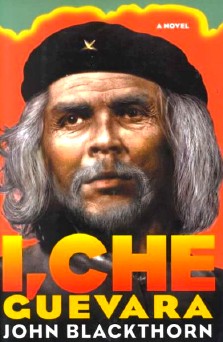|
I, Che Guevara / John Blackthorn. - New York : William Morrow & Co., 2000. - 352 p. ; 25 cm.
ISBN 0-688-16760-8
|
NOTE DE L'ÉDITEUR
: Sometime during the summer of 1999 a mysterious elderly stranger
appears in rural towns around Cuba, quietly advocating a new kind of
politics he calls « the true republic ».
Old-timers begin to suspect that the stranger, who calls himself
Ernesto Blanco, may actually be the martyr Ernesto
« Che » Guevara. Shortly thereafter, Fidel Castro
steps down from power in exchange for a commitment from the United
States to recognize Cuba and lift the embargo. Diplomatic recognition,
in turn, is conditioned upon free elections.
Two traditional parties are formed : One is a successor to the
Communist Party and the other is composed of U.S./Mafia-backed Cuban
exiles. As the True Republic movement spreads like wildfire throughout
Cuba, each faction devises a plot to get rid of Ernesto Blanco —
by assassination if necessary.
I, Che Guevara
culminates in a frantic last-minute run up to the election in which
assassins from both sides play key roles. Within the context of this
revolutionary adventure, Cuba becomes a metaphor for the struggle of
people throughout the world to evolve a new kind of politics, a
politics with a human face.
|
JONATHAN KEATS :
In the Cuba of John Blackthorn's new thriller, Fidel Castro has taken
early retirement, Havana is about to hold free elections and, most
incredibly of all, a man who is very likely Che Guevara, presumed dead
since 1967, is on the campaign trail, converting illiterate peasants to
the revolutionary political philosophy of Thomas Jefferson. […]
What's winning about the novel's premise is the opportunity it affords
the author to consider the Cuban people apart from their government.
His prose may read like boilerplate, but Blackthorn — the
pseudonym of “ a political figure whose name is well known in
international capitals and intelligence circles (1) ” —
provides readers with the benefits of his Latin American experience.
[…] Somewhat less persuasive is the plot itself, an account of
Cuba's first democratic elections, in which […] villagers,
joined by university students, become the foundation of a political
movement vital enough to threaten both the post-Castro Communists and
the Miami expatriate millionaires.☐ The New York Times book review, January 30, 2000 [en ligne]
| 1. | Gary Hart, sénateur démocrate (1975-1987), candidat à la présidence en 1984 et 1988. |
|
| COMPLÉMENT
BIBLIOGRAPHIQUE |
- « I, Che Guevara », New York : Harper Collins, 2008
|
|
|
| mise-à-jour : 5 août 2013 |
 | |
|